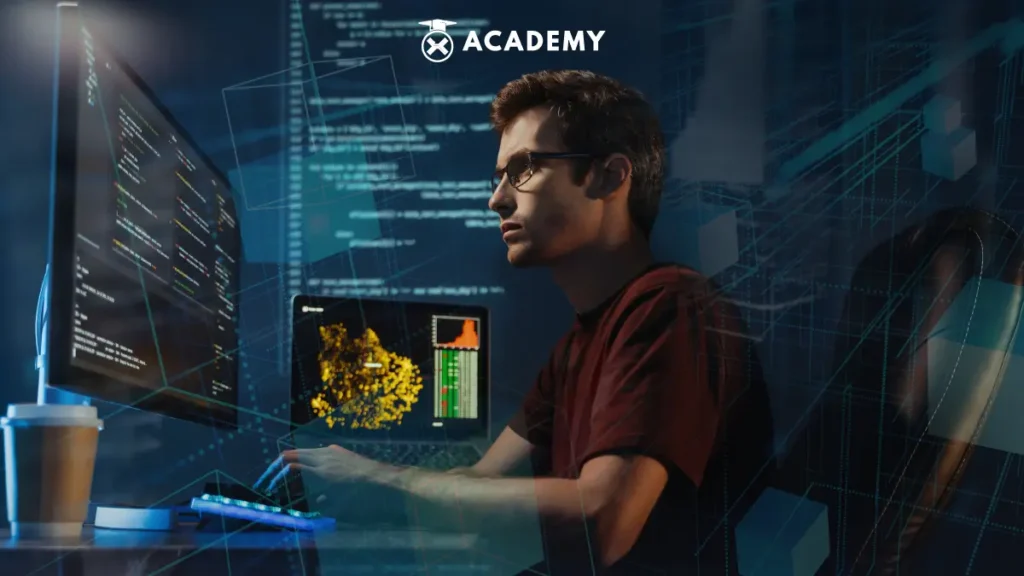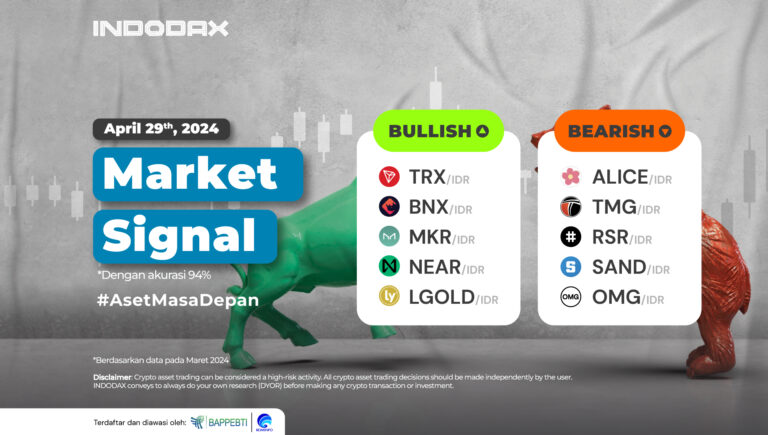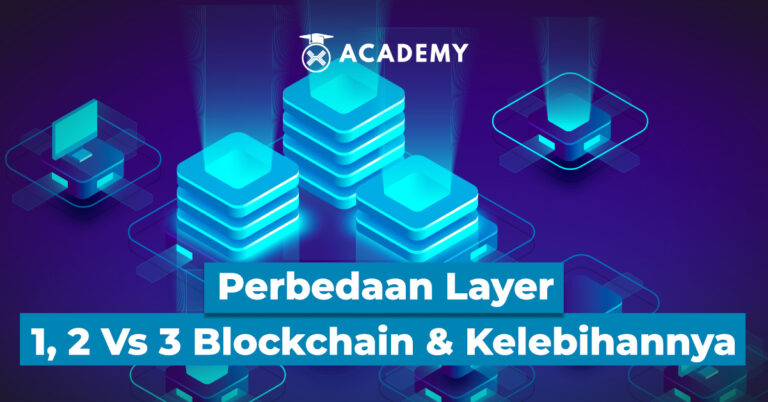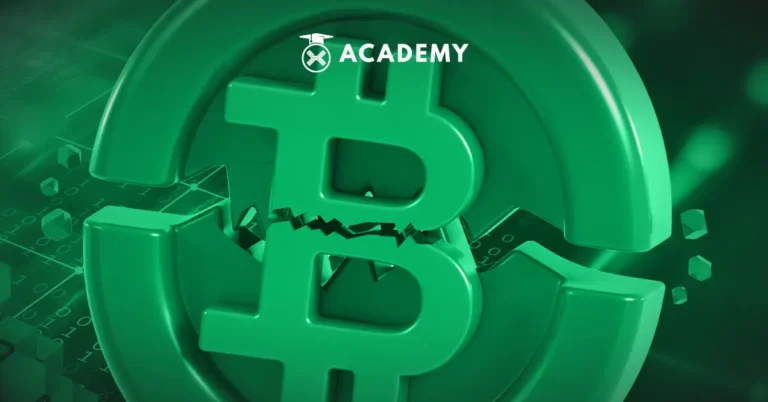In this digital era, blockchain technology is gaining rapid popularity, not only among IT experts but also among the general public. This increasing popularity cannot be separated from the number of benefits it offers. One of the main benefits of blockchain technology is high security.
Compared to traditional systems, blockchain uses strong encryption to protect data, making it difficult for malicious parties to manipulate or compromise the integrity of transactions. Additionally, due to its decentralized nature, blockchain reduces the risk of data loss as there is no single point of failure that could result in the loss of all information.
In the world of blockchain, there is a profession called blockchain developer. A blockchain developer is an individual who works in the field of technology and is responsible for developing and maintaining applications, as well as platforms that use blockchain technology. This profession requires a deep understanding of blockchain concepts and mechanisms, as well as the ability to implement them in the creation of innovative and secure applications and platforms.
So, now, let’s understand more about what blockchain is and the use of its technology, what a blockchain developer is, its main duties, what skills and qualifications are needed, a blockchain developer platform that is easy for beginners to use, and how to become a successful blockchain developer. Check out the full review below!
What is Blockchain and the Use of Its Technology
Blockchain is a digital ledger that records and secures every transaction in a vast distributed database across many computers. The uniqueness of this technology lies in the use of multiple parties or organizations without involving third intermediaries in the data exchange or transaction process. This approach makes the blockchain more secure because it reduces the risk of system breaches.
In the blockchain structure, there is a sequential blockchain consisting of a ledger, as well as three other key elements: data, hash, and the hash of the previous block. The data stored in blocks depends on the purpose for which they are used. For example, in Bitcoin transactions, blocks store complete details, including the number of coins, sender, and recipient. Hashes identify blocks and their contents uniquely, while hashes of previous blocks carry traces of prior information and secure the blockchain chain.
The application of blockchain technology is very broad and is not limited to the financial sector alone. Although widely used in the financial industry, blockchain is also applied in telecommunications, property, media, medicine, and agriculture. Thus, blockchain technology remains one of the most promising innovations in the global business world, enabling more secure, transparent, and efficient transactions across various economic sectors.
What is A Blockchain Developer?
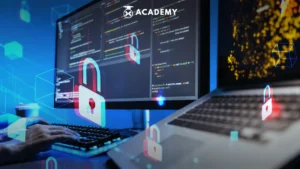
Blockchain developers are software developers who specialize in creating decentralized applications (dApps) and smart contracts using blockchain technology. Its main tasks involve designing, implementing, and maintaining software that operates on blockchain platforms.
The job of a blockchain developer involves several technical skills, including mastery of programming languages, such as Solidity, Java, Python, or C++, and a deep understanding of blockchain protocols, such as Ethereum, Hyperledger Fabric, or Corda.
These developers must also understand important concepts such as distributed computing, cryptography, and consensus algorithms. They can work on various projects, including building decentralized applications for financial services, supply chain management, healthcare, and other industries. Additionally, they will also be involved in creating new blockchain protocols or improving existing ones, testing and debugging code, and collaborating with developers and other stakeholders to ensure the success of the project.
In addition to technical skills, developers must also have problem-solving skills, good communication skills, and strong collaboration skills. As for other added values, to need to be able to work efficiently in a team, adapt to changing technology and requirements, and stay abreast of the latest developments in the world of blockchain.
Main Duties of A Blockchain Developer
Blockchain developers are responsible for the blockchain network and the applications that run on the network. They are also involved in designing blockchain networks, analyzing existing systems, and evaluating new technologies.
The specific roles and responsibilities of a blockchain developer change depending on the situation within an organization but generally include the following:
- Conduct research, evaluation, and creation of blockchain networks and decentralized applications.
- Testing and troubleshooting projects using blockchain technology.
- Maintain cybersecurity practices across blockchain technology by implementing cryptographic methods such as hash functions and digital signatures. Then, ensure compliance with various security measures.
- Research and assess trending new tools and technologies and incorporate them into blockchain networks or applications.
- Develop, test, and manage blockchain networks with an emphasis on ensuring efficiency, distributed computing, consensus protocols, and cryptography.
- Develop, test, and monitor client applications, decentralized applications, and other application stack components.
- Perform application maintenance on the server and user sides, including application security engineering when necessary.
- Developing applications or systems using blockchain technology as a solution for organizations.
- Record development procedures, artifacts, blockchain applications, and best practices.
- Uses various interpersonal skills such as cooperation, collaboration, communication, problem-solving, and multitasking to ensure an organization achieves its goals.
What Abilities and Qualifications Are Required?
If you want to become a blockchain developer, then, of course, you need a deep understanding of blockchain technology and its basic principles. Apart from that, a developer must also have two key skills, namely:
- Programming Languages: It is important to have expertise in programming languages ??such as Solidity, C++, Java, JavaScript, Python, and Go. These languages ??are commonly used in blockchain development.
- Data Structures and Algorithms: A deep understanding of data structures and algorithms is necessary to optimize the performance of blockchain applications.
Apart from that, according to Coursera, a blockchain developer must also understand and master the following important concepts:
- Cryptography: Understand cryptography and crypto techniques such as hashing, digital signatures, and encryption, as these form the basis of blockchain technology.
- Smart contracts: The ability to develop and deploy smart contracts that automate transactions and enforce business logic on the blockchain is also critical.
- Distributed computing: Since blockchain is a distributed technology, having experience with distributed systems and the ability to develop decentralized applications are crucial skills.
- Website development: Experience with web development frameworks, such as ReactJS and AngularJS, is required to build blockchain-based web applications.
- Blockchain platforms: Understanding popular blockchain platforms, such as Ethereum, Hyperledger Fabric, Corda, and EOS, is essential for developing blockchain applications on these platforms.
- Testing and debugging: Experience with testing frameworks, such as Mocha and Chai, and the ability to debug blockchain applications effectively.
- Security: Having a deep understanding of security protocols and the ability to identify and address potential security vulnerabilities in blockchain applications is an important skill for a developer.
Get to know the Blockchain Developer Platform that is Easy to Use for Beginners
For those of you who are new to blockchain technology, it is important to choose a platform that is easy to use. The following are several examples of blockchain platforms that are recommended because of their ease of use, including:
1. Ethereum
Ethereum is one of the most popular blockchain platforms renowned for its diversity and ease of use.
The platform provides various tools and resources for developers, including Solidity, a programming language for smart contracts, and the Truffle suite, which includes development tools for building and testing decentralized applications.
2. Algorand
Algorand is known for its simplicity and ease of use among blockchain developers. The platform provides various developer tools and resources, including SDKs for several programming languages ??and a web-based IDE for building and deploying smart contracts.
3. Cardano
Cardano is designed to be easy for developers, even those with limited experience in blockchain development. The platform offers a variety of developer tools and resources, including a programming language called Plutus, designed specifically for smart contract development.
Choosing a platform that suits your needs and level of experience will help facilitate your blockchain application development process. With the right platform, you can optimize creativity and productivity in developing blockchain projects.
How to Become A Successful Blockchain Developer
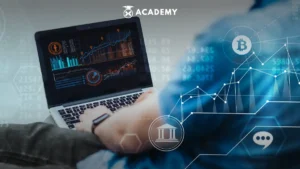
To become a successful blockchain developer, there are several tips you need to know. Here are some tips for becoming a successful blockchain developer, namely:
1. Understand Blockchain Basics
For those interested in entering a career as a blockchain developer, the first step to take is to understand the basics of blockchain technology. The best way to do this is through self-study, taking a course at an educational institution, or using an online tutorial platform. Make sure to have a deep understanding of important concepts in blockchain, such as decentralization, hash functions, security, and consensus mechanisms.
2. Get Practical Experience
After understanding the basic blockchain concepts, these aspiring developers must download and use an existing wallet or decentralized application. They must check it carefully and understand how the application and wallet work. Learn how to create and use wallet addresses and associated private keys for encryption.
Additionally, they should try purchasing crypto assets to understand the consumer experience more deeply, including the transfer fees charged to consumers. Also, learn how to interact with exchanges and innovative smart contract platforms. Consider joining developer forums to interact with other developers.
3. Learn Coding Skills and Get Certified
For those interested in becoming a blockchain developer without prior experience in programming, you should consider attending a programming school, taking an entry-level course at an educational institution, or taking an online course.
Learn various programming languages ??commonly used in blockchain technology, such as JavaScript and C++. Understand how to implement the deterministic nature of transactions in code, as well as have a thorough understanding of code analysis and other aspects of blockchain technology.
4. Take on the Role of a Blockchain Developer
One can now become a blockchain developer by participating in hackathon competitions or training at blockchain training institutes, ultimately obtaining certification. Afterward, they can develop the blockchain by creating Genesis blocks, adding other blocks, validating the blockchain, and finally using it in real projects.
5. Develop the Required Technical Skills and Soft Skills
Aspiring blockchain developers should develop the necessary technical skills, such as mastering data structures, cryptography, web development, blockchain architecture, smart contract development, and understanding enterprise blockchain ecosystems and platforms, such as Ethereum.
Apart from that, it is also important to hone soft skills such as good leadership, effective communication, teamwork, and flexibility in dealing with change. These skills will help them be successful as blockchain developers.
6. Connections with Employers Who Recruit Blockchain Developers
Blockchain developers who have completed the steps above should look for work to test and profit from their skills. They can try to find an internship or hands-on job opportunities, usually at blockchain companies, financial services providers, public sector organizations, or software-as-a-service (SaaS) product sellers. This job may also be available remotely or on campus. There are various job opportunities for blockchain developers, including becoming a blockchain UX designer, developer, or quality engineer.
Difference between Blockchain Developer and Blockchain Engineer
Even though they are often considered the same, blockchain developer and blockchain engineer are different jobs.
The blockchain developer is responsible for creating application features and interfaces using programming languages ??and writing multithreaded code. They conduct research, analysis, and design of blockchain networks, consensus protocols, and decentralized applications. Their proficiency in programming languages, such as Java and Python, as well as having a deep understanding of cryptography, is beyond doubt. They should also have good analytical and creative skills to solve problems efficiently.
On the other hand, blockchain engineers are tasked with developing and implementing digital blockchain solutions to provide solutions to organizations. They may also be asked to conduct research and analyze an organization’s needs, as well as work with existing open-source technologies. Additionally, they may be asked to develop and implement infrastructure assets, accelerators, and regulatory processes. Its main task is to ensure that applications in the blockchain network are secure. Blockchain engineers work on existing platforms, such as Ethereum and Hyperledger.
What are the Benefits of Becoming a Blockchain Developer?
If you are interested in becoming a blockchain developer, then you need to know what the benefits of this job are. Here are some of them:
1. High salary
The gap between demand and supply in the blockchain industry remains high because the industry is still relatively new. Organizations are willing to pay more to attract more experts. According to the latest data from Payscale, as quoted from spiceworks.com, the average annual salary for blockchain engineers is $107,000. Individuals looking for a technology field to start their careers should consider becoming a blockchain developer.
2. Flexible work location
The lack of sufficient blockchain experts often makes organizations offer flexible work plans. This makes organizations have to look for talent from all over the world, resulting in the availability of remote jobs for blockchain developers.
3. Opportunity to work in large organizations
Large organizations such as Microsoft and Samsung are adopting blockchain technology in their networks. This opens up potential job opportunities in large organizations as a blockchain developer with better employee benefits.
Conclusion
In conclusion, blockchain developers play a central role in the crypto ecosystem, with the main task of creating and optimizing blockchain technology and decentralized applications. They are also responsible for designing, implementing, and maintaining blockchain networks, smart contracts, and user interfaces.
The role of blockchain developers is crucial in securing transactions, increasing efficiency, and ensuring data integrity in the crypto world. However, blockchain developers face major challenges, including keeping up with rapid technological developments to remain relevant and effective in their work. Additionally, data security and privacy continuously require updates and improvements. Facing these challenges certainly requires in-depth knowledge, creativity, and strong analytical skills from blockchain developers.
So, now you understand what blockchain is and the use of its technology, what a blockchain developer’s main tasks are, what skills and qualifications are needed, and others. Furthermore, you can also read more complete articles about blockchain technology on INDODAX Academy.
It is important to know that to deepen your understanding of blockchain technology, it is highly recommended that you read the complete articles on INDODAX Academy. In collection of articles the INDODAX Academy article, you will find exclusive material related to various aspects of blockchain, from the basics to more complex concepts. By reading articles on INDODAX Academy, you will get an in-depth insight into how blockchain technology works, its applications, and the latest developments in the crypto world.
Let’s continue to deepen your knowledge about the blockchain and crypto assets only on INDODAX Academy!




